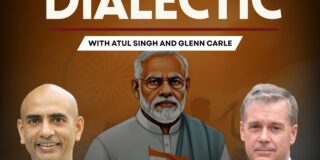Washington-based policy wonk and former Republican Congressional candidate Christopher Roper Schell shares his thoughts on the new Speaker of the House of Representatives, Mike Johnson. The new speaker is an unexpected choice that has left many Republican insiders, including Members of Congress, bewildered.
Election denial?
Republicans are not the only ones who are confused. Diplomats from some of America’s Western allies have expressed concerns over the choice of a speaker who denies the legitimacy of the 2020 presidential election.
Schell explains that Mike Johnson is not as simplistic as he’s been made out to be by the media — a sort of one-dimensional conspiracy theorist. His concerns are a little more subtle than that.
At the time of Texas v. Pennsylvania, one of the most notable Supreme Court cases that dealt with the validity of the elections in 2020, Johnson filed an amicus curiae brief with the Court. The primary concern that he expressed in the brief was that local governments were making decisions about voting procedures with little or no legislative oversight. This lack of legal process created the bad appearance of illegitimacy, even if no outright tampering occurred — something which Johnson did not claim.
So, the anxiety about Johnson being an “election denier” is somewhat overblown. He did not endorse conspiracy theories about election tampering. He did question the legal legitimacy of some results, although he has even walked that position back somewhat. As far as the near future is concerned, in Schell’s opinion, American democracy is not in peril.
Other diplomats, hailing from the Global South, talk about the optics of Johnson’s speakership. How does the United States look, holding the Summit for Democracy in March and then choosing an election denier for a speaker in October?
Schell responds that this is not a material concern. This summit was inaugurated by President Joe Biden and is not longstanding US policy. Furthermore, the House of Representatives has very little to do with US diplomacy. So, President Joe Biden can hold his summits without worrying about who is sitting at the other end of Pennsylvania Avenue.
The unstable Republican speakership
Johnson’s predecessor as speaker, Kevin McCarthy, had struggled to attain his nomination. It took him an unheard-of 15 ballots to finally win a majority in January 2023. He was only able to do so by making deep concessions to his party’s right wing. In particular, he agreed that a single member could initiate a “motion to vacate” and potentially oust him from his office.
The US at the time was about to reach its debt ceiling, and the House, which has the power of the purse, needed to authorize further borrowing. McCarthy was forced to compromise with House Democrats in order to pass a deal to allow this. Because of that compromise, Representative Matt Gaetz exercised the right to initiate a motion to vacate. On October 2, in a historic first, Republicans threw their own speaker out.
No clear successor was waiting in the wings. Without a leader in the House, Republicans had no one to gather around and form consensus for bills. So, the Republican-controlled House was adrift. If Republicans had not elected another speaker by tha ( deadline of November 17, they probably could not have avoided a government shutdown. This would have been a disaster for the party, as every news source would have called it a Republican-led shutdown. Not only that, but Congress would not have been able to take any other action, such as authorizing more aid for Ukraine or Israel.
So, with such a high cost to not electing a speaker, is it true that anyone would have been better than no one? One hesitates to say yes, but it is true that nearly anyone who could pull off the job, at least temporarily, would be a sheer necessity given the circumstances.
So who is Mike Johnson, anyway?
Mike Johnson may not be the most notable man on Capitol Hill, but he is not just anyone, either. So, who is he? Where does he come from, and what does he believe?
A Louisiana native, Johnson studied business administration at Louisiana State University and earned his law degree there, too. An evangelical Baptist, he spent the better part of his legal career defending religious causes.
Johnson represents the 4th district in the state’s west. Steve Scalise, the House Majority Leader, also hails from Louisiana, representing the 1st district, which covers New Orleans’s suburbs. The Republican caucus considered but passed over Scalise for speaker, judging him to be too much of an insider. They similarly considered and rejected Ohio Congressman Jim Jordan. Tom Emmer, from Minnesota, lasted two hours before dropping out. Finally, Johnson became the caucus’ fourth nominee and won.
Unlike fellow Louisianan Scalise, who is more moderate, Johnson is firmly on the right wing. He is a staunch religious conservative and a pro-lifer. While he has strong convictions, he is not a strident, talking-point ideologue; in fact, he is something of a policy wonk.
Quite popular, Johnson ran unopposed in his last election and received unanimous support from his own party in the speakership vote. This is notable, given the shaky support behind the previous candidates for speaker.
Johnson does not always follow the party line. The adoptive father of a black child, he forcefully condemned the killing of George Floyd at the hands of police as “an act of murder.” This statement caused some consternation among his fellow party members, who viewed it as a liberal narrative.
Immediately after becoming speaker, Johnson declared war on the nation’s debt. He has made addressing the solvency of the federal government’s entitlement programs — chiefly Social Security and Medicare — a key part of his policy.
Johnson has little to no experience running a legislative agenda, which is an asset for him as Republicans did not want an insider. He is not exactly a newbie, as he is on his fourth term, and he previously chaired the House Judiciary Subcommittee on the Constitution and Limited Government. As far as insider connections and personal Capitol Hill loyalties go, though, Johnson is beholden to no one and is thus an unknown quantity.
Significance of a Trump-supporting speaker
Let us turn now to the broader significance that Johnson’s election has for broader American political culture. Donald Trump, the previous president, is now undergoing no less than four felony trials. Yet, the new speaker is an election doubter and a firm Trump supporter. In many other countries, politicians would not tolerate even a whiff of criminality surrounding their allies. So do Republicans tolerate Trump and his friends?
Schell is not sounding the alarm bells yet. It would be a bigger problem, perhaps, if Johnson had supported Trump out of personal loyalty. But his concerns about the election were principled, not personal. So they are no evidence that corruption is seeping into the House.
Likewise, many point to the fiasco of McCarthy’s ouster and the subsequent scramble for a new speaker as a sign of growing chaos in the Republican party. But in Schell’s view, this was the doing of eight radicals, not of the party. Notably, Gaetz and the other members who helped to oust McCarthy were not rewarded with the speakership themselves. Indeed, most House Republicans are furious with them. So they should not be taken as representative of the party as a whole.
So, while the razor-thin Republican majority empowered some Republicans to punch above their weight, the institutions themselves have not been subverted. And they can even be strengthened. Hopefully, Republicans will get rid of the single-member motion to vacate and perhaps add a new rule to allow for an ousted speaker to continue until his replacement has been found. In any case, Republicans now have a speaker who is more popular and thus in a surer position than McCarthy was ten months ago.
Where do we go from here?
Johnson is likely to push for a stopgap measure to keep the government funded for a few months. This will buy his party time to negotiate the traditional annual budget, which is passed as twelve separate bills to allow for greater legislative scrutiny. This avoids cramming the entire budget into a single omnibus bill, which Republicans wish to avoid as such a process makes scrutiny more difficult and thus encourages overspending.
Johnson is a strong supporter of aid to Israel but opposes further aid to Ukraine. There are some signs, however, that he is willing to negotiate on the latter point. Democrats may persuade him to package aid to Israel and Ukraine together in a single bill.
Democrats may perhaps be displeased that they can no longer lambast “Republican chaos” in the House. Some are taking the opportunity to portray Johnson as the far-right speaker of a far-right party. But, in truth, it is too early to tell whether or not Johnson will be a man that Democrats can work with. His values are known, but his legislative style is not. Will he be a fighter, or a negotiator? We will just have to wait and see.
[Anton Schauble wrote the first draft of this piece.]
The views expressed in this article/podcast are the author’s own and do not necessarily reflect Fair Observer’s editorial policy.














Commenting Guidelines
Please read our commenting guidelines before commenting.
1. Be Respectful: Please be polite to the author. Avoid hostility. The whole point of Fair Observer is openness to different perspectives from perspectives from around the world.
2. Comment Thoughtfully: Please be relevant and constructive. We do not allow personal attacks, disinformation or trolling. We will remove hate speech or incitement.
3. Contribute Usefully: Add something of value — a point of view, an argument, a personal experience or a relevant link if you are citing statistics and key facts.
Please agree to the guidelines before proceeding.